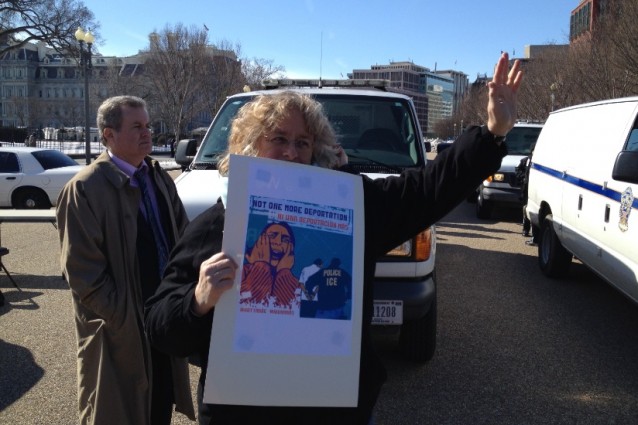How Immigration Advocacy Has Changed From A Washington Boys Club To A Gritty Girl Movement

 By Angela Maria Kelley, Hispanically Speaking News
By Angela Maria Kelley, Hispanically Speaking News
I started my career over twenty years ago as a young immigration attorney in an under-funded community legal organization in Washington, D.C. representing refugees, mostly Central Americans, fleeing brutal conditions in their home countries wrecked by civil war. My clients were almost all female, intentionally assigned to me, the only young female staffer, as they were more comfortable talking in quiet Spanish about the abuse they endured at the hands of military forces in their home countries. With the exception of two male attorneys and one paralegal, the agency’s director and the support staff were nearly all women, a staffing situation that seemed typical in my previous jobs in the non-profit world. After a few years, frustrated with broken immigration laws and biased immigration proceedings, I left direct legal services to pursue a job at the National Immigration Forum focused on the wider picture: advocating to change our nation’s immigration laws for the better.
When I entered the first meeting of the Board of Directors of my new-a policy and advocacy group in Washington D.C., I thought I was in the wrong place. Yes, there were female board members, mainly from coalition groups and local service organizations like my previous employer, but almost all the officers were male. The board’s “heavy weights” — the powerful people of the immigrant rights movement were men who worked in Washington. They cut quiet deals in back rooms with Members of Congress (also men) and dominated the scarce press opportunities.
In the years that followed — from the 1990’s to today — there has been a slow but steady emergence of high-powered, high-visibility female leaders in the field of immigrant activism and a redistribution of power from inside to outside the Beltway. Today’s stories on immigration advocacy more often than not quote immigrants, not just “influentials,” and many of those immigrants are women. And today’s influentials who have the attention of lawmakers aren’t cutting back-room deals, but are instead confronting them: at their offices, at town-halls, and in the pages of the press.
The cutting-edge advocacy started by the fearless DREAMers, young unauthorized immigrants who grew up here and are Americans in all but their papers, has been one of the key factors putting immigration reform back on the agenda in the last few years. And the DREAMers are stacked with women leaders who are, as they say, “undocumented and unafraid.” Gaby Pacheco, for example, brought as a seven-year-old by her parents from Ecuador, led three other DREAMers on the Trail of Dreams, a 1,500 mile walk from Miami to Washington D.C., in January of 2010, and has now become the head of a new scholarship fund for DREAMers called The DREAM.US. The leadership of United We Dream — the highly respected network of DREAMers — is loaded with indomitable girl power: Lorella Praeli, UWD’s Advocacy and Policy Director originally from Peru, has appeared in TIME magazine and sat with Rep. Zoe Lofgren (D-CA) in last month’s State of the Union address. Cristina Jimenez, UWD’s Managing Director who grew up in the U.S. undocumented, was profiled in the popular Sunday Parade magazine in an article on how “Latinos are reshaping America.” And finally, there is the story of Erika Andiola, the founder of the Arizona chapter of United We Dream, who used the power of social media to plead for help after immigration officials stormed her home, arrested her mother and brother, and put her mother on a deportation bus bound for Mexico. Erika was able to mobilize the immigrant advocacy community, and ultimately was able to turn the bus carrying her mother around, bringing her home.
The leaders of immigrant advocacy coalitions in big cities like Los Angeles and Boston, and of major advocacy groups like the National Immigration Law Center and Asian Americans Advancing Justice, are all women. And inside the Beltway, Janet Murguia, the President of the National Council of La Raza, and Cecilia Muñoz the head of the White House Domestic Policy Council, are true heavyweights. Their stories vary, but the themes are the same: these women warriors, most of them immigrants or daughters of immigrants, have risen to lead a movement — a movement that at its core is about family and the future, two topics women take to heart. Their leadership has changed the conversation in Washington from a sterile policy debate to one about the human toll of lives lost and torn apart by our failed immigration laws. No longer is the morality of this issue dismissed as insignificant and falling on deaf ears. The reason is that, for these women, immigration is an intensely personal issue, and, as women, their advocacy style brings the intensity of their experiences and perspectives to life.
The emergence of women as the voices and visionaries for immigrants’ rights has been accompanied by the feminization of immigration. The images so often played on Fox News of single men crossing the border illegally to work are outdated: Female immigrants are now 51.1 percent of the immigrant population. Nearly half of the 11.7 million unauthorized immigrants live in families with a partner and child. Deportations in record numbers (nearly 2 million during the Obama administration alone) have spread like a metastasizing virus through entire communities. While men are disproportionately the ones deported, women are left to hold families together, economically and emotionally. Often from the tragedy of a family torn apart, like that of Erika Andiola and countless others, what emerges are some of the most powerful advocates for reform.
While many in the corporate world discuss Sheryl Sandberg’s “lean in” approach as a way to build women’s leadership, in the immigration world a “double down” approach has been necessary. Women leaders in the immigration field have had no choice but to unflinchingly face the destruction caused by broken immigration laws and keep pressing for relief and reform. Inspired, like I am, by my own mother’s journey from her native Bolivia to the U.S., women leaders are asking themselves the key question: “What kind of country do I want for my children and my sisters’ children?” They are declaring, by their actions, growth in numbers, and strength that they won’t quit until our nation’s immigration policies reflect our nation’s values of family and freedom.
This article was originally published in HispanicallyHispeaking News.
Angela Maria Kelley is Vice President for Immigration Policy at the Center for American Progress.
[Photo by Think Progress/Esther Y. Lee]
